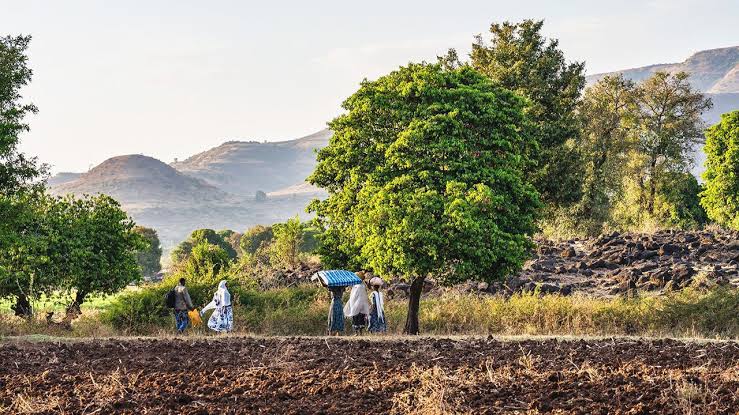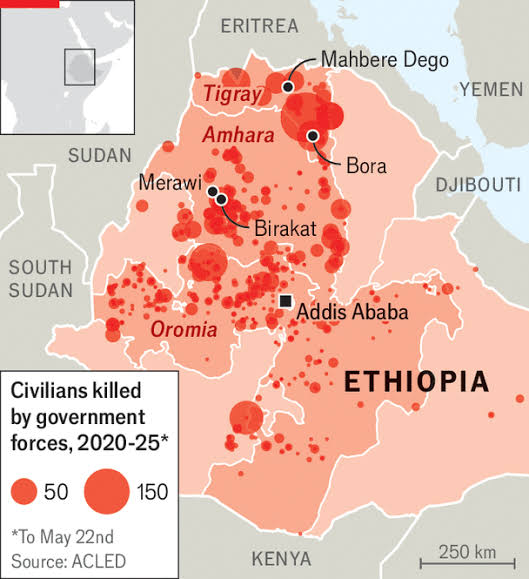 Here’s a detailed and plain-language long-form article based on the topic: “What a massacre reveals about Abiy Ahmed’s Ethiopia” — unpacking the deeper political, ethnic, and governance issues facing the country under Prime Minister Abiy Ahmed.
Here’s a detailed and plain-language long-form article based on the topic: “What a massacre reveals about Abiy Ahmed’s Ethiopia” — unpacking the deeper political, ethnic, and governance issues facing the country under Prime Minister Abiy Ahmed.
In recent years, Ethiopia has become a country defined by both hope and heartbreak. Just a few years ago, Prime Minister Abiy Ahmed was being praised internationally as a visionary reformer. In 2019, he was awarded the Nobel Peace Prize for ending a two-decade-long conflict with neighboring Eritrea. But today, Ethiopia is wrestling with deep divisions, a fragile sense of national unity, and recurring violence that has shocked both its citizens and the international community.
One of the most haunting examples of this reality is a massacre that unfolded in a remote region of the country—another grim chapter in a nation struggling with ethnic violence, mistrust in leadership, and a dangerously splintered political landscape.
The massacre occurred in an area where ethnic tensions have been simmering for years—possibly in Oromia, Amhara, or Benishangul-Gumuz—where various armed groups, sometimes referred to as “ethnic militias,” operate. In this case, dozens—possibly hundreds—of civilians, including women and children, were killed in a targeted attack. Survivors often describe the same horrific pattern: villages are surrounded, houses set on fire, and people attacked with machetes and bullets.
What makes this even more painful is that these massacres are no longer isolated incidents. They are part of a recurring pattern that many Ethiopians now associate with life under Abiy’s leadership.
Ethiopia’s political structure is based on a system called ethnic federalism. Introduced in the 1990s by the ruling Ethiopian People’s Revolutionary Democratic Front (EPRDF), the system was meant to give Ethiopia’s many ethnic groups autonomy over their regions, languages, and governance.
But in practice, it has often deepened ethnic divisions and created competition between groups over land, political power, and resources. Under Abiy, the unraveling of this system has accelerated, even as he promised to unify the country.
His decision to dissolve the old ruling coalition and replace it with a new Prosperity Party, aimed at building national unity, was seen by many ethnic groups—especially Tigrayans and Oromos—as an attempt to centralize power. This move sparked resistance and, in some regions, armed rebellion.
 One of the biggest turning points in Abiy Ahmed’s leadership was the war in Tigray. What began in late 2020 as a military operation against the Tigray People’s Liberation Front (TPLF) turned into a full-blown civil war. Thousands were killed, millions displaced, and horrific human rights abuses were reported—including mass killings and sexual violence.
One of the biggest turning points in Abiy Ahmed’s leadership was the war in Tigray. What began in late 2020 as a military operation against the Tigray People’s Liberation Front (TPLF) turned into a full-blown civil war. Thousands were killed, millions displaced, and horrific human rights abuses were reported—including mass killings and sexual violence.
Although a peace agreement was signed in 2022, the wounds from that conflict remain deep. The war also damaged Abiy’s international image and raised serious questions about his commitment to human rights and inclusive governance.
The Role of the Government: Inaction or Complicity?
One of the most troubling aspects of these massacres is the apparent inability—or unwillingness—of the Ethiopian government to prevent them. In some cases, security forces have been accused of arriving too late, ignoring warnings, or even taking sides. In other cases, survivors claim there was no response at all.
Critics argue that the government’s failure to protect its citizens has eroded trust in federal institutions. Some believe that the central government is overwhelmed and struggling to manage the country’s many armed conflicts. Others accuse Abiy’s administration of playing political games—turning a blind eye when violence serves its interests.
Human rights organizations, such as Amnesty International and Human Rights Watch, have documented these atrocities and called for independent investigations. Yet accountability remains elusive.
For many Ethiopians, especially those in regions plagued by violence, the promises of reform and prosperity feel distant. Parents bury children. Communities live in fear. And the nation’s once-hopeful future feels increasingly uncertain.

